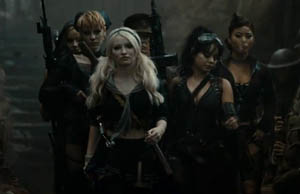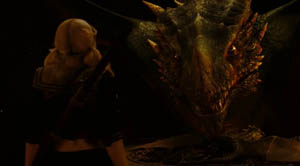|
This is a film which I'd been hoping I would like but which I strongly suspected I wouldn't. After all, director Zack Snyder had succeeded, against all probability, in bringing Watchmen to the screen, and had done a pretty respectable job at it. I was hoping therefore that he would surprise me with this movie and disprove my expectations, but I left myself wide open for this sucker punch, and it never quite landed. 
In an inversion of a typical fairy tale setup, two girls are left in the care of their evil stepfather after mom dies and leaves her daughters with the sum total of her estate. Before the title has appeared, little sis is dead and big sis has been committed to the nuthouse for her murder. To keep the truth from ever surfacing, dad greases the palm of an unscrupulous attendant, who arranges for a lobotomy to take place in just five days. Seemingly without hope, the girl seeks refuge in fantasy, wherein she's a super-skilled ass-kicker. No, wait; that's not quite correct. She first seeks refuge in a straightforward allegory, where the asylum has become a brothel and the sleazebag arranging for her impending brain-jab is the pimp. Forced to develop her "own special dance" for the high-priced clientele she will be expected to entertain, she then retreats into a second layer of fantasy, where the ass-kicking superhero persona, known only as Babydoll, takes center stage. The nested fantasy sequences involve elaborate good-vs-evil combat scenarios, in a sort of Inception for beginners. This pattern repeats for each alleged dance sequence-I say "alleged," because the fantasy fight scenes are all we ever see of them; in a film that wastes no opportunity to put pretty girls on display, I found myself wondering if star Emily Browning simply couldn't dance to save her life, which is unfortunate seeing as that's precisely what her character is supposed to be doing. I don't think that it would be going out onto all that rickety a limb to assume that the fantasy battles were writer-director Zack Snyder's real point of interest here, with the rest of the film existing simply as a structure into which he could dump numerous scenes which could not possibly fit into any sort of conventional, rational narrative. Consider one battle, set in the trenches of World War I, featuring Babydoll and her army of four fellow prisoners in a battle involving steam-and-clockwork-powered German zombies, biplanes, blimps, a giant robot and what might well have been the Red Skull's father, set to a remix of "White Rabbit." Is it visually stimulating and imaginative? Unquestionably. It's also almost totally arbitrary. Why is any of this here? The girls are trying to steal a map from the Germans in the fantasy because they're trying to steal a map to the labrythine brothel one level up in the delusion. Nothing but the most obvious, broad-stroke correlations exist between the layers of fantasy. When Dom Cobb unwittingly brought a train into his dream in Inception, it was because of a very specific, story-centric reason. The content of Babydoll's dance reveries by and large does not have any bearing, symbolic or otherwise, on the story as a whole. It's there because it looks cool, and because without it, the film would be about an hour long. I can't say it's not entertaining, but I rapidly tire of Snyder's action directing style, and by "rapidly" I mean "about ten minutes into 300." One gets the impression that the only reason this film exists is because no one would allow him to make a series of the world's most expensive music videos. 
This clumsy structure could be more easily forgiven with the inclusion of compelling characters, but alas, we'll have to use our own imaginations and fantasies to cull those into being. Snyder's Babydoll is clearly intended to be some action icon, but after all this time, she's just another little girl. This is no Sarah Conner or Ellen Ripley, or Kill Bill's The Bride, a woman who overcomes extreme obstacles through iron determination or leadership charisma, but rather one who becomes a hero because she can twirl swords around while wearing an undersized schoolgirl's outfit, some kind of faux feminism which "empowers" women by 1. giving them superpowers they don't really have, and 2. making sure they look hot whilst using them. While I don't doubt that a woman in a dire and debilitating bind would imagine herself gifted with incredible abilities as a coping mechanism, I doubt they would imagine the miniskirts, garters and fishnets, choosing to resist the dominion of males by wholeheartedly buying into the role society has picked for them. The ultimate resolution is interesting, and unexpected. I say "interesting" primarily because I don't think it ends up working all that well, but it at least hints at some semblance of an idea behind it all. It's regrettable, then, that the worst moment is saved till the last, when a piece of narration aimed squarely at the audience is read over a black screen, explaining, in the most blunt and ham-fisted manner, what the moral of the story was, in case you somehow didn't catch it. It's as if the director assumed that the audience was lobotomized, as well. -review by Matt Murray
|
|
||||||||